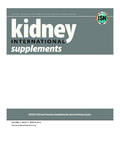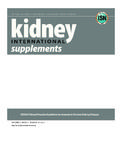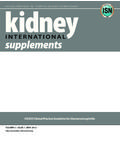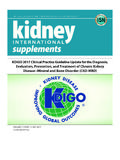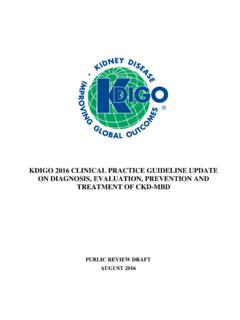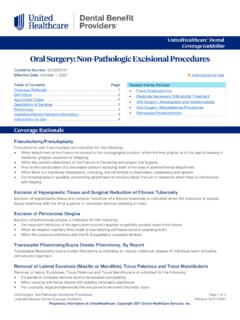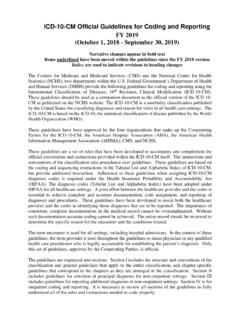Transcription of Guideline on CKD - KDIGO
1 Guideline on CKD. Bertram Kasiske, MD. Mandaluyong City April 23, 2014. Kidney Disease: Improving Global Outcomes What is CKD? When bubbles settle on the surface of the urine, they indicate disease of the kidneys, and that the complaint will be protracted. -- Hippocrates 400 BCE. Kidney Disease: Improving Global Outcomes A decade of efforts to define CKD. K/DOQI CPG for CKD: KDIGO 06 CC: Definition KDIGO CPG on Evaluation, classification &. & classification of CKD. CKD Kidney Int stratification. Am J Kidney Dis Kidney Int 2007;72:247 Suppl 2013; 3(1). 2002; 39:S1. KDIGO 04 CC: Definition KDIGO 09 CC: Definition & classification of CKD. & classification of CKD. Kidney Int 2005;67:2089 Kidney Int 2010; 80:17. 2002 2003 2004 2005 2006 2007 2008 2009 2010 2011 2012. Kidney Disease: Improving Global Outcomes KDOQI 2002 definition and staging Definition: Kidney damage for 3 months, as defined by structural or functional abnormalities of the kidney, with or without decreased GFR or GFR <60 mL/ for 3 months, with or without kidney damage.
2 GFR. Stage Description (ml/ m2). Kidney damage with 1 > 90. normal or GFR. Kidney damage with 2 60-89. mild in GFR. 3 Moderate in GFR 30-59. 4 Severe in GFR 15-29. 5 Kidney failure < 15 (or dialysis). Am J Kidney Dis 2002; 39:S1. Kidney Disease: Improving Global Outcomes KDIGO surveys and Controversy Conferences in 2004 and 2006. Two modifications to account for dialysis and transplantation. GFR. Stage Description Treatment (ml/ m2). Kidney damage with 1 > 90. normal or GFR. Kidney damage with 2 60-89. mild in GFR T if kidney 3 Moderate in GFR 30-59 transplant 4 Severe in GFR 15-29 D if dialysis 5 Kidney failure < 15 (or dialysis). Kidney Int 2005;67:2089. Kidney Int 2007;72:247. Kidney Disease: Improving Global Outcomes The Definition, classification and Prognosis of CKD: KDIGO . Controversies Conference 2009. On the basis of analyses in 45 cohorts that included 1,555,332 participants from general, high-risk, and CKD populations, the conference recommended retaining the current definition for CKD, and to modify the classification by emphasizing clinical diagnosis, adding albuminuria stage, and subdividing stage 3.
3 Kidney Int. 2011; 80:17. Kidney Disease: Improving Global Outcomes 6 KDIGO CKD Work Group Work Group Co-Chairs Adeera Levin Paul E Stevens Vancouver, Canada Canterbury, UK Work Group Rudy Bilous Brenda R Hemmelgarn Michael G Shlipak Middlesbrough, UK Alberta, Canada San Francisco, USA Josef Coresh Kunitoshi Iseki HaiYan Wang Bal8more, USA Nishihara, Japan Beijing, China Angel de Francisco Edmund Lamb Colin White Santander, Spain Kent, UK Vancouver, Canada Paul de Jong Andrew S Levey Christopher G Winerals Groningen, Netherlands Boston, USA Oxford, UK Kathryn Gri th Miguel C Riella York, UK Curi8ba, Brazil Kidney Disease: Improving Global Outcomes CKD Evidence Review Team Kidney Disease: Improving Global Outcomes The CKD Guideline team Kidney Disease: Improving Global Outcomes Kidney Disease: Improving Global Outcomes CKD Guideline goal to clarify the definition and classification system of CKD, and to develop appropriate guidance as to the management and care of people with CKD foster an extended collaborative research agenda.
4 Kidney Disease: Improving Global Outcomes What the Guideline covers Target population: all adults and children identified with CKD who are not on renal replacement therapy. CKD: any (or unknown) cause. Target audience: nephrologists, primary care physicians, non-nephrology specialists, clinical chemists and other practitioners caring for adults and children with CKD. Target healthcare settings: primary, secondary and tertiary care. Kidney Disease: Improving Global Outcomes What is not in the Guideline Evaluation and management of people receiving renal replacement therapy Specific diagnostic approaches to people with AKI, GN or other specific diagnoses Treatment of each of the specific causes of CKD. Management of pregnancy in women with CKD. or of pregnant women who develop kidney disease Detailed management of complications of CKD. Kidney Disease: Improving Global Outcomes Quality High A Strength of We recommend.
5 1. of Moderate B recom- evidence mendation Low C We suggest . Very low 2. D. Grade 1A .. Grade 2D (8 options); plus Not Graded . Guyatt GH, et al. BMJ 2008; 336:924. Kidney Disease: Improving Global Outcomes Topics Section 1: Definition & classification Section 2: Definition, Identification & Prediction of CKD Progression Section 3: Management of CKD Progression & Complications Section 4: Other Complications Section 5: Referral to Specialists & Models of Care Kidney Disease: Improving Global Outcomes SECTION 1: Definition and classification Kidney Disease: Improving Global Outcomes Audience Response Question 1: Which of the following would NOT meet the KDIGO definition of CKD 3 months of: 1. GFR 65 & urine albumin 60 mg/24h 2. GFR 65 & urine RBCs with IgA on biopsy 3. GFR 65 after kidney transplant 4. GFR 65 after donating a kidney for transplant 5. GFR 45 at age 75 years Kidney Disease: Improving Global Outcomes Definition of CKD.
6 : CKD is defined as abnormalities of kidney structure or function, present for 3 months, with implications for health (Table 2). (Not Graded). Kidney Disease: Improving Global Outcomes Audience Response Question 2: Which of the following justifies including GFR <60 mL/ in defining CKD: 1. increased risk for CVD. 2. increased risk of all-cause mortality 3. increased risk of drug dosing errors 4. increased risk of metabolic complications 5. all of the above Kidney Disease: Improving Global Outcomes Rationale for defining CKD by GFR. <60 mL/ Kidney Disease: Improving Global Outcomes Rationale for defining CKD by GFR. <60 mL/ All-Cause Mortality; eGFR. Kidney Disease: Improving Global Outcomes Rationale for defining CKD by GFR. <60 mL/ GFR <60 mL/ is associated with a higher risk of complications of CKD: Drug toxicity Metabolic and endocrine complications CVD and death Kidney Disease: Improving Global Outcomes Rationale for defining CKD by ACR <30 mg/g All-Cause Mortality; ACR.
7 Kidney Disease: Improving Global Outcomes Staging of CKD. : We recommend that CKD is classified based on cause, GFR category and albuminuria category (CGA).(1B). : Assign cause of CKD based on presence or absence of systemic disease and the location within the kidney of observed or presumed pathologic- anatomic findings. (Not graded). Kidney Disease: Improving Global Outcomes GFR categories : Assign GFR categories as follows [Table 5]. (Not Graded): Kidney Disease: Improving Global Outcomes Rationale for GFR categories AS Go, et al. New Engl J Med 2004; 351:1296. Kidney Disease: Improving Global Outcomes Title AS Levey, et al. Kidney Int 2011; 80:17. Kidney Disease: Improving Global Outcomes AS Levey, et al. Kidney Int 2011; 80:17. Kidney Disease: Improving Global Outcomes Albuminuria categories : Assign albuminuria* categories as follows (Not Graded): *note that where albuminuria measurement is not available, urine reagent strip results can be substituted.
8 Kidney Disease: Improving Global Outcomes Kidney Disease: Improving Global Outcomes Predicting prognosis of CKD. : In predicting risk for outcome of CKD, identify the following variables: 1) cause of CKD;. 2) GFR category;. 3) albuminuria category;. 4) other risk factors and comorbid conditions. (Not Graded). Kidney Disease: Improving Global Outcomes Kidney Disease: Improving Global Outcomes Evaluation of CKD: chronicity : Evaluation of Chronicity : In people with GFR <60 mL/ or markers of kidney damage, review past history and previous measurements to determine duration (Not Graded). If duration is >3 months, CKD is confirmed. Follow recommendations for CKD. If duration is not >3 months or unclear, CKD is not confirmed. Patients may have CKD or acute kidney diseases (including AKI) or both and tests should be repeated accordingly. Kidney Disease: Improving Global Outcomes Evaluation of CKD: cause : Evaluation of Cause : Evaluate the clinical context, including personal and family history, social and environmental factors, medications, physical examination, laboratory measures, imaging, and pathologic diagnosis to determine the causes of kidney disease.
9 (Not Graded). Kidney Disease: Improving Global Outcomes Audience Response Question 3: Which does KDIGO recommend for defining &. classifying CKD: 1. measure GFR with plasma or urine clearance of an inert tracer (inulin, iohexol, etc.) whenever possible 2. use a cystatin C rather than a Cr formula for eGFR. 3. use the CKD-EPI formula for eGFR. 4. use the best available formula for estimating GFR. with serum Cr Kidney Disease: Improving Global Outcomes Evaluation of CKD: GFR. : We recommend using serum creatinine and a GFR. estimating equation for initial assessment. (1A). : We suggest using additional tests (such as cystatin C. or a clearance measurement) for confirmatory testing in specific circumstances when eGFR based on serum creatinine is less accurate. (2B). : We recommend that clinicians (1B): use a GFR estimating equation to derive GFR from serum creatinine (eGFRcreat) rather than relying on the serum creatinine concentration alone understand clinical settings in which eGFRcreat is less accurate.
10 Kidney Disease: Improving Global Outcomes Cystatin C. : We suggest measuring cystatin C in adults with eGFRcreat 45-59 who do not have other markers of kidney damage if confirmation of CKD is required. (2C). If eGFRcys / eGFRcreat-cys is also <60 mL/ m2, the diagnosis of CKD is confirmed If eGFRcys / eGFRcreat-cys is >60 mL/ m2, the diagnosis of CKD is not confirmed Kidney Disease: Improving Global Outcomes Performance of the CKD-EPI and MDRD study equations AS Levey, et al. Ann Intern Med 2009; 150: 604. Kidney Disease: Improving Global Outcomes Measuring GFR. : We suggest measuring GFR using exogenous filtration markers under circumstances where more accurate ascertainment of GFR will impact on treatment decisions ( acceptance for kidney donation, dose adaptation of toxic drugs). (2B). Kidney Disease: Improving Global Outcomes Evaluation of CKD: albuminuria : We suggest using the following measurements for initial testing of proteinuria (in descending order of preference, in all cases an early morning urine sample is preferred) (2B): 1) urine albumin-to-creatinine ratio (ACR).
